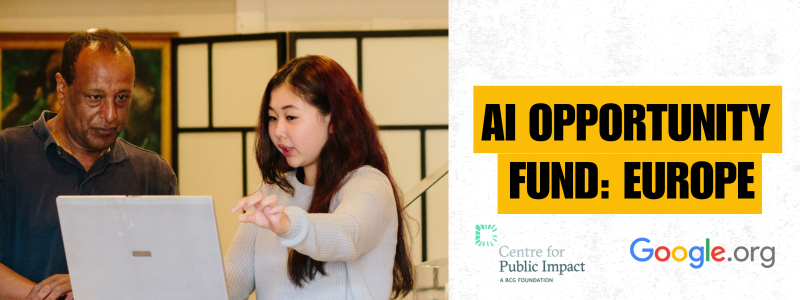

Embracing AI: Empowering vulnerable workers for a more inclusive future
Article highlights
As we witness AI's complex power, one thing is clear: there is no single solution. Empowering communities lies at the heart of effective AI skilling initiatives - which is why @GoogleOrg & @CPI_foundation are launching the AI Opportunity Fund: Europe.
Share article"By collaborating with social partners and nonprofits, policymakers can ensure that AI education and training efforts are comprehensive and inclusive, reaching those who need it most and democratizing the promise of technology."
Share article🚀 @CPI_foundation & @GoogleOrg are excited to share that the AI Opportunity Fund: Europe is OPEN for applications! Apply now, and your org could benefit from bespoke training 👩🏻🏫 on AI and cash support 💶 to upskill workers across Europe.
Share articleApply for the AI Opportunity Fund: Europe
This is your chance to help vulnerable and underserved communities across Europe benefit from AI’s potential. Start your application today.
As technological progress continues to revolutionize industries, the rapid adoption of artificial intelligence (AI) is sparking intense debates about its impact on the labor market. Historically, innovations like the printing press, the steam engine, and automated looms have transformed employment landscapes.
Still, the pace at which most recent developments, such as generative artificial intelligence, are spreading is much faster than anything the world has seen. While it took almost a century for the steam engine to peak in usage, ChatGPT had 1 million users within a week of its release.
More than one in two companies in China and India has already adopted some AI tools. Yet companies' widespread adoption of these tools raises concerns about their potential to disrupt traditional employment structures. Goldman Sachs estimates that approximately 300 million jobs worldwide could be affected by AI over the next decade.
Although AI can revolutionize industries, boost worker productivity, and improve job quality, its broad adoption presents challenges for the labor market. The OECD 2023 employment outlook underscores this dual narrative: while there is apprehension about AI-induced job displacement, there is also optimism about new employment opportunities.

Will the rise in AI affect vulnerable communities disproportionately?
Regardless of AI’s aggregate effect on employment, there are stark concerns about the risk of AI automation unevenly impacting different socio-demographic groups and widening existing inequalities.
In particular, those from vulnerable groups are most likely to face social barriers to navigating AI and new digital technologies. This includes women, the elderly, low-wage workers, rural communities, migrants, racially minoritized communities, and disabled people. Recognizing and understanding these groups' specific barriers is essential for developing targeted policies and programs to level the playing field.
What can we do to mitigate risks?
What actions can companies, governments, and funders take to reduce AI's adverse, disproportionate risks while supporting its potential for transformative change?
Public policies certainly play a vital role in harnessing AI's potential while addressing associated risks and ensuring equitable access to opportunities for all parts of society. A recent study led by MIT economist Acemoglu highlights how the current fiscal system in the US encourages companies to automate jobs by applying lenient tax rates to technology investments and placing heavier taxes on labor. This incentivises companies to opt for automation rather than investing in their workforce.
ILO economist Merola proposes a solution in the form of a "robot tax," which would impose taxes on companies utilizing AI to automate tasks or services, thereby generating revenue that could support displaced workers.
Calls for Universal Basic Income (UBI) to support workers displaced by automation and AI have also become louder as AI systems' capabilities have accelerated. Advocates of UBI argue that it could offer an antidote to the ailments of modern labor markets, including wage inequality, job insecurity, and the possibility of AI-induced job losses.
Karim Lakhani Harvard Business School Professor“AI won’t replace humans, but humans with AI will replace humans without AI”
However, like previous waves of technical innovation, automation is unlikely to lead to widespread job displacement; rather, it will lead to a shift in the nature of work.
AI holds the promise of making jobs safer across various sectors, such as construction, manufacturing, and agriculture. Moreover, as numerous companies explore the benefits of a four-day workweek, AI is a pivotal force in redefining the traditional 40-hour work paradigm that dominates many professions.
However, realizing these advantages hinges on a commitment to invest in people and their skills. Upskilling and reskilling programs emerge as essential tools in this context, equipping individuals to navigate the evolving job landscape.
Is AI skilling the way forward?
National and regional initiatives are critical in promoting AI literacy and upskilling. Recent studies have demonstrated the effectiveness of upskilling programs, which can translate into a 25% average earnings increase the year after completion.
Across Europe, momentum is building for digital upskilling, with initiatives like Austria's plan for delivering 4,500 digitization workshops. Greece has formed a multi-stakeholder digital coalition, and the UK's National Retraining Scheme is investing £100 million to train workers affected by AI and automation. EU projects like the European Year of Skills and ARISA also aim to bridge AI skill gaps, focusing on vulnerable groups.
However, only a tiny fraction of workers typically take part in standard training programs. Those who do are often the ones who need them the least. According to OECD, the unemployed, low-qualified workers, and those with non-standard contracts are much less likely to attend adult training compared to less vulnerable counterparts.
To effectively address this gap, AI upskilling programs must be tailored to the specific needs of vulnerable groups. By collaborating with social partners and nonprofits, policymakers can ensure that AI education and training efforts are comprehensive and inclusive, reaching those who need it most and democratizing the promise of technology.

Social partners and nonprofits have a key role to play in these conversations
Social partners like trade unions and employee organizations have a unique role in advocating for these initiatives. Through collective bargaining and social dialogue, they can ensure that workers from all backgrounds receive the necessary support and training to adapt to the changing job landscape.
Similarly, nonprofit organizations are instrumental in advocating for and delivering training to underserved communities. Their extensive network and contextual knowledge make them well-suited to represent and reach historically marginalized communities. However, despite the growing momentum for upskilling programs, nonprofits often lack explicit support for these initiatives.
Introducing the AI Opportunity Fund
As we witness AI's transformative, exciting, but complex power, one thing is clear: there is no single solution. The rapid advancements in AI technologies are reshaping our private and work lives, calling for a comprehensive set of measures to ensure that anyone can thrive and no one is left behind. That’s where collaborative efforts come into play.
Empowering communities lies at the heart of effective AI skilling initiatives. It is not just about teaching new skills; it’s about understanding the unique challenges people face and tackling them with tailored interventions. To do so, it is crucial to involve social partners and nonprofits in these conversations from the beginning. By encouraging dialogue and collaboration, we can equip workers with the knowledge and tools they need to succeed in an AI world.
That’s why we are excited to launch applications for the AI Opportunity Fund: Europe today! In partnership with Google.org, this initiative aims to equip workers, especially those who need more support to upskill themselves, with the foundational AI knowledge and tools required for long-term positive professional outcomes.
We are inviting organizations all around Europe who have connections with vulnerable communities to apply for this €15 million fund. Successful applicants will receive bespoke training on expert-curated AI curricula, ongoing mentorship and guidance, and tailored financial support to facilitate the training, including costs to cover childcare expenses, travel expense reimbursement, and stipends. Our mission is clear: to empower every worker to thrive in the age of AI.
So, if you are a nonprofit, social enterprise, trade union, or research center based in the EU-27, UK, or Ukraine and passionate about supporting communities through workforce transitions, we want you on board!
Find out more about how you can contribute to shaping a more inclusive and resilient society.
Apply for the AI Opportunity Fund: Europe
This is your chance to help vulnerable and underserved communities across Europe benefit from AI’s potential. Start your application today.
Written by:
You may also be interested in...


PRESS RELEASE: Google.org launches new AI Opportunity Fund in partnership with the Centre for Public Impact

